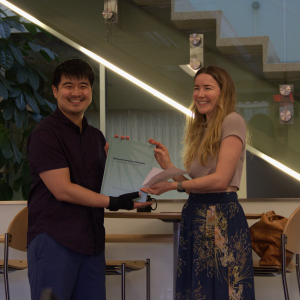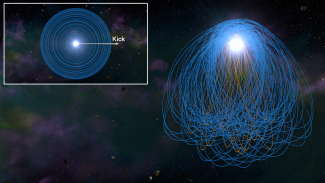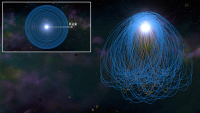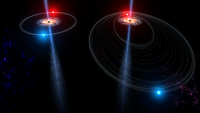Ann-Marie Madigan
Eccentric stellar disks orbiting massive black holes
The double nucleus of the Andromeda galaxy has been a puzzle since its discovery by balloon-borne experiments in the early 1970s. It is best modeled as a single eccentric disk of stars, which orbits a massive black hole.
Gas clouds plunging through an accretion disk
The physics of how gas accretes onto supermassive black holes is hugely important in astrophysics. It is a difficult topic of research however, involving three-dimensional, hot, magnetic plasmas.
Instability in the outer solar system
The orbits of icy minor planets beyond Neptune are doing something very strange: they all tilt and pitch in similar ways, and maybe even cluster together on the sky. In a 2016 paper, my collaborator Mike McCourt and I show that when gravitational forces between minor planets on eccentric orbits are included in N-body simulations, the orbits incline rapidly off the disk plane, and tilt and pitch in exactly the same way.
Halle
(UC Berkeley)








 The Physics Frontiers Centers (PFC) program supports university-based centers and institutes where the collective efforts of a larger group of individuals can enable transformational advances in the most promising research areas. The program is designed to foster major breakthroughs at the intellectual frontiers of physics by providing needed resources such as combinations of talents, skills, disciplines, and/or specialized infrastructure, not usually available to individual investigators or small groups, in an environment in which the collective efforts of the larger group can be shown to be seminal to promoting significant progress in the science and the education of students. PFCs also include creative, substantive activities aimed at enhancing education, broadening participation of traditionally underrepresented groups, and outreach to the scientific community and general public.
The Physics Frontiers Centers (PFC) program supports university-based centers and institutes where the collective efforts of a larger group of individuals can enable transformational advances in the most promising research areas. The program is designed to foster major breakthroughs at the intellectual frontiers of physics by providing needed resources such as combinations of talents, skills, disciplines, and/or specialized infrastructure, not usually available to individual investigators or small groups, in an environment in which the collective efforts of the larger group can be shown to be seminal to promoting significant progress in the science and the education of students. PFCs also include creative, substantive activities aimed at enhancing education, broadening participation of traditionally underrepresented groups, and outreach to the scientific community and general public.